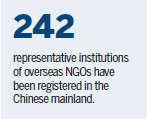Registration 'smooth' for overseas NGOs under national law
China has imposed efficient management on overseas NGOs and provided more convenience for their activities in the mainland thanks to a law adopted early this year, public security authorities said.
Since the law on the management of overseas NGOs on the Chinese mainland took effect on Jan 1, 242 representative institutions of overseas NGOs have been registered, according to figures from the Ministry of Public Security released on Friday. Of them, 61 are from the United States, the largest country of origin.
Under the law, overseas NGOs must be registered and regulated by central or provincial-level police authorities.
The number of overseas NGOs that are registering and holding activities on the mainland keeps rising. For example, another 65 US NGOs are now working on their registration applications, according to the ministry.
Also, 344 temporary activities that overseas NGOs applied to conduct in the Chinese mainland have been approved, the new figures show.

Representative institutions and those holding temporary activities covered more than 400 overseas NGOs from 28 countries and regions, since those two groups may overlap in some areas. The subject areas involved include economy, education, health, technology, environment and poverty alleviation, according to the ministry.
Li Xiaodong, head of the overseas NGOs administration office with the Beijing Public Security Bureau, said 83 of the 242 registered institutions are based in Beijing. "The law makes our management more efficient and gives us clear procedures to follow on how to offer overseas NGOs better services," he said.
Li said such services include explaining the law and registration procedures to overseas NGOs via social media platforms like WeChat and via telephone hotlines. Police officers who handle related matters are good at English to facilitate communications, he said.
Now, an overseas NGO will be told whether they can register or not within 60 days. "If they have any question regarding the registration, such as how to submit materials or which department is responsible for their activities, we'll tell them in detail to make sure their problems are fully solved," Li added.
Jennifer Driscoll, senior manager at the Bill and Melinda Gates Foundation, said they have intensified communication with the bureau since the law's adoption. "We wanted to get registered and meet the requirements as quickly as we could to ensure our ongoing operation in the country was not affected.
"The transition and services are very smooth, so we feel positive about that. We also have confidence that our problems will be solved quickly, so we're not concerned, and (we) just look forward to seeing the ongoing partnership."
Katherine Wilhelm, a program officer at the Ford Foundation, also applauded the efforts the bureau made after the law took effect. But she noted that the social sector is undergoing rapid change and innovation, and regulations need to keep pace with the times.
She also said there are many overseas NGOs that have no office in the mainland and no Chinese-speaking staff, so "an English website could be very helpful".



























